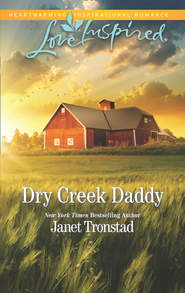По всем вопросам обращайтесь на: info@litportal.ru
(©) 2003-2024.
✖
Easter In Dry Creek
Автор
Год написания книги
2019
Настройки чтения
Размер шрифта
Высота строк
Поля
Copyright (#litres_trial_promo)
Chapter One (#ulink_7d61863b-b6f9-5865-9918-dab19f237ffa)
Snowflakes hit his windshield as Clay West peered into the black night, barely managing to see more than a few yards down the icy asphalt road that lay in front of his pickup’s headlights. He’d exited the interstate and could see the twenty or so frame buildings that made up the small, isolated town of Dry Creek, Montana. This place—between here and the Nelson ranch—had been the closest thing to a home he’d ever known.
“Not that it worked out,” Clay muttered to himself. He’d first come here as a foster kid, and he’d foolishly believed what the social workers said about him finally having a family. Of course, they had been wrong. Being a foster kid wasn’t the same as being part of a family.
As he kept the pickup inching forward, Clay studied the road farther ahead until he gradually realized the town did not look the way he remembered. Four years had passed since he’d lived in this area. He’d been seventeen at the time. The heavily falling snow made it hard to see, especially in the dark, so that might have been part of his confusion now. And maybe it was because of the snowdrifts next to them that the clapboard houses seemed shrunken in the storm. But he didn’t recognize the gas station, either.
Suddenly, he asked himself if he’d gone down the wrong road in the night. There were no traffic signs in this part of the state. There hadn’t been many turns off the freeway, but he could have chosen the wrong one. Maybe he wasn’t where he thought he was. Right then, a gust of wind came out of nowhere. The gray shapes shifted and the town’s church materialized out of the swirling storm. “Whoa.” He braked to a stop, his fingers gripping the wheel and his breath coming hard. He wasn’t as indifferent to this place as he had thought.
The large white building had no steeple. Cement steps led up to an ordinary double door made out of wood. On the ground, a plastic tarp had been laid over flower beds that went along both sides of the church.
One thing was certain, though—he was looking at the Dry Creek church and none other. Every year the congregation here forced daffodils to bloom for their sunrise Easter service as a sign of their faith.
Clay let the pickup idle for a bit and took a few deep breaths. He wasn’t going to be hurried through this town, especially not by his own bad memories. Just then a light was turned on in one of the houses down the road. He tensed for a bit and then shrugged. He told himself that whoever it was would go back to bed. He didn’t need to worry. Clay might not be welcome within a hundred miles of here, but he had every legal right to be where he was. The paper in his pocket made that clear when it stated the terms of the early parole he would earn if he spent the next year working as a horse wrangler on the Nelson ranch.
The storm lessened as Clay kept going along the snow-packed road. Finally he came to the drive that led to the heart of the Nelson ranch. When he’d lived here, a locked metal gate always spanned the road just behind the cattle guard. The gate swung free now. Snow had filled in the ditches at the side of the road, but the height of the dead stalks told him that no one had cut back the weeds last fall.
Clay let the pickup sit as he took more time to look around. It was hard to maintain his upbeat attitude looking at the place. He saw a dim light coming from what would be the kitchen of the distant house, but the upstairs was dark. Old habits die hard, and he couldn’t help but count across the line of second-floor windows until he found the one that marked Allie Nelson’s former room. She was the rancher’s daughter. Back before all of his troubles, Clay used to check that window every night from his place in the bunkhouse to see if she had gone to sleep. He never questioned why he did it, but it made him rest easier to know she was safe.
The first portrait sketch Clay had ever drawn was of Allie’s young face looking out that window at night, her whole being showing a yearning that touched him in its simplicity. Looking back, he should have known drawing her had been a mistake. She was the one who had made him yearn for some of those promised family ties the social workers told him about.
As Clay pulled closer to the barn, he saw that it wasn’t just the weeds that had been neglected. Several poles in the corral were down. He realized then that the windows in the bunkhouse looked deserted. They’d built that log structure the year before he’d been sent here. It was long, with two big main rooms and a porch along the length of it. If there were any ranch hands around, they would have been up stirring by now.
He looked out at the fields then. There used to be dozens of horses standing or galloping around the dirt track that lined the small field to the right. The Nelson ranch supplied stock to other ranches and even managed to sell a few to small racing stables. He and Allie both loved discovering which horses had the strength and speed to be racers. It’s what bound them together. Now he saw no animals of any kind.
“Something’s wrong,” Clay said to himself as he kept looking around.
A light flickered and a woman stepped in front of one of the kitchen windows. Clay could see only her shape, but something about the tilt of her head made him think that it was Allie. His breath stopped at the thought. She’d been a girl of sixteen when he knew her. She had to be twenty years old now. Maybe even twenty-one since her birthday would have been last month. But it couldn’t be her; he’d heard she was working at some fancy resort down in Jackson Hole, Wyoming.
He’d rather come up against a dozen raging blizzards than face Allie again. The fierce anger in her eyes at his trial had been harder to bear than hearing the judge pronounce him guilty of armed robbery. He might have endured the censure of the rest of the town if she had stood by him.
He’d been clueless that night about what Allie’s older brother, Mark, was capable of doing when he was drunk, but no one believed Clay’s version of what happened, especially not Allie. Everyone thought Clay had planned the robbery of the gas station, but it had been Mark’s impulsive move.
Clay closed his eyes until the rush of memories stopped. He didn’t like thinking about Mark. Allie’s brother had been shot in the head that night in a scuffle with the store clerk. At first, everyone expected Mark to come out of his coma in time to testify, but it hadn’t happened. The last Clay had heard was that the doctors were saying Mark was not expected to ever regain consciousness. He’d had some kind of fever that compounded the swelling in his brain.
Clay turned the engine off. The pickup jerked as the muffler rattled to a stop. He heard a cat’s indignant hiss then and he looked down. He’d forgotten about his passenger. A starving cat had snuck into the pickup when Clay stopped for gas a few hours ago. She was too tame to be feral, but none too friendly, either.
He figured that big empty-looking barn over there might as well house the cat and the kittens that, if he was any judge, she’d be having soon. From the looks of the place, the ranch could use a good mouser. So Clay grabbed the tabby and, without giving her time to protest, tucked her under the coat he was wearing. Someone had left the sheepskin coat on the seat of the pickup that had been left for him in the prison parking lot.
Clay briefly wondered who his benefactor was as he opened the pickup door, stepped down and started walking. Then he told himself he was making too much of the kindness. He was a man who stood alone. That was unlikely to change here.
* * *
Inside the house, a thin trail of steam was still rising from the skillet that Allie Nelson had dropped into the sink water before she stepped over to push open the only window that wasn’t painted shut in her father’s cluttered kitchen. She’d spent the past couple of years working as a fry cook in a popular restaurant in Jackson Hole and, even with that, she had burned the eggs on her first morning back on the ranch.
She’d been in the hall tying her nephew’s shoes, but that would be no excuse in her father’s eyes. Despite her shouldering the loan payments for her brother’s medical bills, which had taken everything she and her father had and which led to her father borrowing against the ranch to pay the rest, her father still treated her like she was barely older than young Jeremy.
The smoke from the skillet was disappearing. The winter air blew in through the open window, and Allie closed her eyes before leaning forward against the counter. She was tired to the bone, she thought as she stood there. But she couldn’t give up. The next trip here to the ranch she was going to make sure all of the windows opened as they should. Then she’d get down some of those leftover building supplies from the hayloft in the barn and paint the kitchen walls a bright sunny yellow. She would not like Mark to see the house like this; it was depressing. She’d make their house look happy again before he came home.
Against all odds, her brother had started to slowly come out of his coma this past fall. For a long time the doctors said they expected him to recover. But, when he didn’t, they decided things were worse in his brain than they had initially thought. However, Allie’s father kept saying Mark had an IQ of 156 and that his son’s genius brain would find a way to heal itself.
Allie had heard that IQ statistic so many times growing up that she figured it was seared on her memory. But she did not share her father’s confidence in her brother’s high IQ to heal him. She turned to someone more powerful. More than once she knelt at her mother’s grave and pleaded with God to save her brother, promising she would take better care of him this time if she could only have one more chance.
Now Mark was coming out of his coma. The doctors couldn’t explain it. They said it was impossible, but the swelling in his brain had gone down. First, a finger moved, and then some weeks later Mark cleared his throat and tried to speak. Finally, his eyes flickered and he started to eat through a straw. That had gone on for months. Everyone had kept Mark’s progress quiet, though. In the beginning, his improvements were so slight that they weren’t sure he’d stay on track with his recovery. Then they weren’t sure he could take the excitement of other people knowing what had happened.
Allie had gotten back to the ranch only last night, but she was planning to drive to the hospital nursing home to see her brother on Monday.
“You making bacon with them eggs?” Her father’s querulous voice floated down the hallway and interrupted her thoughts. “Jeremy and I like bacon with our eggs. Three slices for me.”
She looked up but saw no one. Her nephew and her father were still in the back bedroom.
Allie turned to face the hallway. She heard the giggle of her three-year-old nephew and the creak of the springs on her father’s bed, which meant that the little boy no doubt raced his plastic horse across the edge of his grandfather’s mattress.
Jeremy was bringing joy to this old house, even if they saw him only once in a while. He and his mother lived in Idaho, and this was the first time that she had left Jeremy here alone. Allie had asked for time off from work so she could be here to help watch over him.
“The doctor said you can’t have more than a small slice of bacon,” Allie called to her father. She’d spoken on the phone with the doctor last week. “Your cholesterol is too high.”
Actually, the specialist had said her father should have an aspirin every morning and start eating turkey bacon, but Allie was taking things slowly. Her father refused to consider eating what he called fake bacon. She was stretching the doctor’s advice by giving him a small piece of the real stuff and two eggs.
It wasn’t until she started back to the sink and passed the smaller window in the kitchen that she glanced out toward the barn and stopped midstride. She hadn’t seen that pickup sitting there when she had arrived late yesterday. The pickup was usually parked behind the barn. She didn’t know why her father kept the old thing after what happened with it that awful night when Mark had been shot. The pickup was practically falling apart, the red paint faded to mauve except on the dented bumper where the bare metal showed through in a long scratch.
She twisted her neck to get a full view of the yard. Sure enough, a man was walking toward the house.
“Company coming,” Allie called as she stood back. Her father must have lent the vehicle to a neighbor and the man was bringing it back. “Best get your robe on.”
She picked up the long metal spatula that was lying on the counter. Whoever the man was he had most likely eaten breakfast already, but she didn’t want to turn anyone away without some hospitality. Having company in this house was as rare as a party these days. She’d toast slices of the whole-grain bread she’d brought with her from Jackson Hole and pull down the crock of honey to go with it. The coffee was already brewing. She’d also get started on new eggs. Her father would want some even if the other man didn’t.
She was pleased to know one of the neighbors had felt free to ask her father for the loan of his old pickup. Ever since Mark had been hurt, her father had stopped going to church services. He said it was because he had to rush to make it to the nursing home before visiting hours closed, but she knew, even though Clay West was clearly the one at fault, her father felt the whole family had been shamed that night. He’d been avoiding everyone since then. He had plenty of time to visit Mark after church.
Allie heard a sound and turned.
“Who is it?” her father asked. He was peeking out a door off the hallway. “I hope it’s not Mrs. Hargrove. I’m not presentable. She said she might come by.”
Allie would rather the visitor be the sweet older woman. She was the traditional Sunday school teacher for children of Jeremy’s age, and Allie thought it was time her nephew joined the class, at least when he was staying with her and her father.
“It looks like a man, so your robe will be fine.”
“Does he have on an old sheepskin coat?”
“How’d you know?” she asked as she twirled to stare. Those coats were no longer common. Everyone preferred puffy jackets in neon or pastel colors. For one thing, they were washable, and there wasn’t a dry cleaner this side of Miles City.
“I’ll put my overalls on.” Her father turned without answering her. “I sent Jeremy to his room to get dressed.”
Allie stepped over and opened the main door. No one had taken its screen off last fall, and the latch had gotten damp and rusted even more. There were enough things that needed doing in this old house that she could spend a month here instead of the two weeks she’d arranged to take off from her job.
Flakes of snow blew toward the house, sticking to the screen door, but she made no move to wipe them off. Allie shivered from the cold, and her breath was coming out in white puffs. It was difficult to identify the man walking toward the house because he had his head down. The leather coat flapped around his legs. The garment was half-open, and a gray plaid shirt covered his chest. He held one of his arms like he was holding something inside his coat. Worn denim jeans fit his long legs, and cowboy boots sank into the snow.











